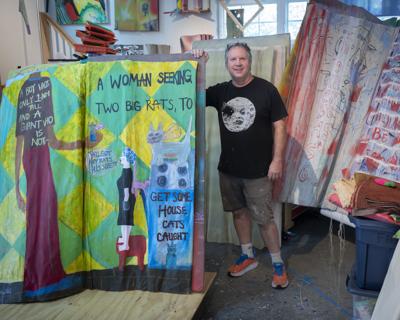Local artist and Austin Peay State University professor Paul Collins wants to make books that are “too big to ban” — and he’s doing exactly that through a public art project he calls the Unbannable Library.
Drawing from a medium he previously developed to display his work, Collins has distributed giant homemade books to roughly 20 teams of artists and writers to fill with their responses to book censorship. Coinciding with the national Banned Books Week (Sept. 22-28), the results will be peppered throughout libraries across Middle Tennessee in the coming weeks before culminating in a joint exposition at the Southern Festival of Books on Oct. 26 and 27 — the same place Collins exhibited his big books last year, and where he got the idea for this project.
In recent years, the Tennessee General Assembly’s Republican supermajority has passed a slate of bills that censor what can be taught to students in K-12 schools and which books schools have access to. The legislation and a handful of conservative groups have ignited hundreds of book challenges across the state — many of which highlight the experiences of LGBTQ characters and people of color. Though not all of the challenges lead to book bans, some materials have indeed been removed from school libraries or school curricula. Other complaints have made it harder to get certain books in some Tennessee public libraries, though the phenomenon has mostly been avoided in Metro Nashville Public Schools and public libraries.
Talking to librarians, advocates, activists and students about state and local book bans and book challenges
Collins sees book bans as more than just a response to mature words in texts, but as a way for those in power to suppress the experiences of others.
“That’s a problem for me — who’s trying to encourage my students to trust their life experiences and to make art based on it,” says Collins, who teaches in APSU’s Department of Art and Design.
Collins’ big books range in size from around the height of a bedside table to a whopping 6-and-a-half feet. They’re made using a variety of materials such as bamboo reed fencing, muslin, chicken wire and more. They feature page-like canvases that people are encouraged to interact with by turning.
The books will be filled with a range of art and text inspired by banned books. References include everything from Walt Whitman’s Leaves of Grass toMaia Kobabe’s Gender Queer, Sandra Cisneros’ The House on Mango Street, Margaret Atwood’s The Handmaid’s Tale and more — including original works by the local artists involved with the project. When the Scene makes a recent visit to Collins’ studio to discuss the Unbannable Library, local artist and poet Christine Hall is there working with Collins, sewing strawberries for a giant book inspired by a poem she wrote when she was 15.
The Scene also discussed the project with poet Ciona Rouse and artist Karen Seapker, who are creating a big book inspired by Toni Morrison’s Sula. That one will appear at the upcoming event Artville (Sept. 27-29 in Wedgewood-Houston) before landing at the Southern Festival of Books. Seapker calls the project “a really creative and playful way at addressing something that is actually very dangerous and damaging.”
“Our liberation is directly tied to being able to have access to each other’s voices — to debate it, to disagree, to allow it to move us and change us,” says Rouse, who also hosts a regular banned-book club with Aria Cavaliere at The Blue Room at Third Man Records.
Tennessee State University assistant professor in art education Mike Mitchell is leading a handful of students in filling their own book through his Art and Social Practice class. Not only will the students fill the book with their own contributions, but they are also inviting other students and artists to fill it. Mitchell says he hopes to counter the restrictive nature of book bans with a sense of openness for the project.
A similar topic comes up in conversations with both the TSU students and Rouse and Seapker — this country’s history of limiting (and even at times criminalizing) Black people’s access to books and literacy as a form of suppression. Tanyah Lowery says that as a student attending a historically Black university, joining the project and learning about censorship feels particularly important. Likewise, classmate Ramaya Lee-Mosely discusses pushing past feelings of nervousness to speak up on the topic in order to inspire others.
As book censorship fosters a culture of fear and hesitancy among librarians who could face legal ramifications for doing their job — or frustration for those seeing books they love being restricted — it has also sparked civic engagement. From people seeking out banned books and creating book clubs, to others protesting book censorship and initiating community art projects, the restrictive climate has generated renewed energy around challenged texts, and the Unbannable Library seeks to harness that momentum.
Collins says he hopes his project will get more people into libraries to play around with these “big, goofy, joy-filled books.”






